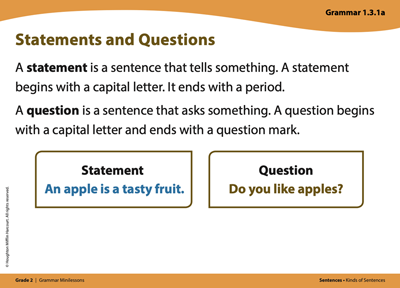Grammar: Statements and Questions
Grammar: Statements and Questions

There are different kinds of sentences.
A statement is a sentence that tells something. It begins with a capital letter and ends with a period.
A question is a sentence that asks something. It begins with a capital letter and ends with a question mark.
- Example: The apples are tasty. Where did you get these apples?
To tell if a sentence is a statement or a question, I ask:
- Does the sentence tell something or ask something?
- Does it end with a period or a question mark?
The first sentence tells me those apples are tasty. The sentence begins with a capital letter and ends with a period. This sentence is a statement.
The second sentence asks where you bought the apples. It also begins with a capital letter, but it ends with a question mark. This sentence is a question.
Let’s review the sentences below to identify the type of sentence (statement or question), and if they should end in a question mark (?) or a period (.).
- The library is full of books. (This is a statement and should end with a period: .)
- Do you like books? (This is a question and should end with a question mark: ?)
- What kind of books do you like? (This is a question and should end with a question mark: ?)
- Sam likes books about nature. (This is a statement and should end with a period: .)
- Maria reads all kinds of books. (This is a statement and should end with a period: .)
Texas Tech K-12
-
Address
Texas Tech Plaza | 1901 University Ave, Lubbock, TX 79401 -
Phone
(800) 692-6877 -
Email
ttuk12@ttu.edu

